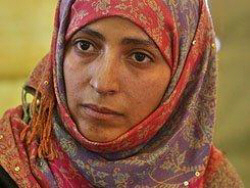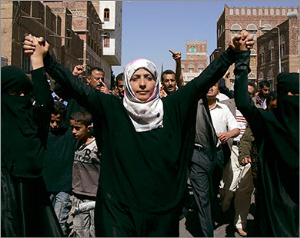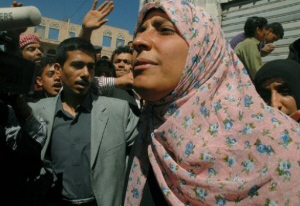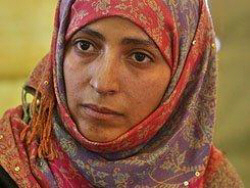Yemeni Tawakkul Karman, one of three women who awarded the Nobel Peace Prize on Friday, dedicates her unexpected win to the activists of the Arab Spring.
 The peace activist Tawakul Karman, who was detained briefly during protests against President Ali Abdullah Saleh, told Reuters the peaceful revolution to topple him would continue. Karman is a mother of three who heads the human rights group Women Journalists without Chains. She has been a leading figure in organizing the protests against Saleh that kicked off in late January.
The peace activist Tawakul Karman, who was detained briefly during protests against President Ali Abdullah Saleh, told Reuters the peaceful revolution to topple him would continue. Karman is a mother of three who heads the human rights group Women Journalists without Chains. She has been a leading figure in organizing the protests against Saleh that kicked off in late January.
"This is a victory for the Yemeni people, for the Yemeni revolution and all the Arab revolutions. This is a message that the era of Arab dictatorships is over. This is a message to this regime and all the despotic regimes that no voice can drown out the voice of freedom and dignity," the 32-year-old mother of three said.
"This is a victory for the Arab Spring in Tunis, Egypt, Libya, Syria and Yemen. Our peaceful revolution will continue until we topple Saleh and establish a civilian state."
Tawakul has been a key figure among the youth activists since they began camping out in an urban space dubbed 'Change Square' in central Sanaa in February demanding the end of Saleh's three-decade family rule.
 She has often been the voice of the street activists on Arabic television, giving them on the ground reports of the situation at the square outside Sanaa University, where dozens of activists have been shot dead by government forces.
She has often been the voice of the street activists on Arabic television, giving them on the ground reports of the situation at the square outside Sanaa University, where dozens of activists have been shot dead by government forces.
"This is a confirmation from the world that Yemen is on the brink of a new era, an era of freedom and equality," Karman said. "I dedicate this award to the Yemeni people and the youth of the Arab Spring, and to the Arab world and to every martyr who has died for freedom."
Yemen is an extremely conservative society but a feature of the revolt there has been a prominent role for women who turned out for protests in large numbers. The uprising has, however, been one of the least successful, failing to unseat President Ali Abdullah Saleh as the country descends into failed state status and armed groups take increasingly central roles.
Yemenis at the square reacted with joy at the news.
"Yemen will go down in history thanks to Tawakul Karman. She deserves the prize. She has kept fighting for the sake of her peoples' freedom," Abdulbari Taher, a protest leader told Reuters on Friday.
 A government official also praised Karman's award, expressing hope it would lead to a resolution of a crisis that has ground Yemen's economy to a halt.
A government official also praised Karman's award, expressing hope it would lead to a resolution of a crisis that has ground Yemen's economy to a halt.
"I'm very happy with the news that she won the Nobel Prize and it's something that all Yemenis can be proud of," Deputy Information Minister Abdu al-Janadi told Reuters. "I hope this prize will be a step toward rationality."
Karman “started her activism long before the revolution took place in Tunisia and Egypt. She has been a very courageous woman in Yemen for quite a long time,” Jagland said.
No woman had won the prize since 2004, when the committee honored Wangari Maathai of Kenya, who died last month at 71. 2004 was also the last year the prize went to an African.
